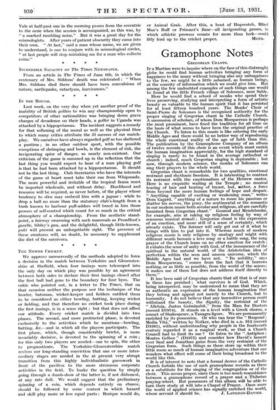THE NEWER CRICKET.
We approve unreservedly of the methods adopted to force a decision in the match between Yorkshire and Gloucester- shire at Sheffield, when four innings were telescoped into the only day on which play was possible by an agreement between both sides to declare their first innings closed after the first ball had gone to the boundary for four byes. The critic who pointed out, in a letter to The Times, that on that occasion neither the purpose nor the technique of the bowler, batsman, wicket-keeper and fielders entitled them to be considered as either bowling, batting, keeping wicket or fielding, and that therefore no cricket took place during the first innings, is in a sense right ; but that does not affect our attitude. Every cricket match is divided into two phases. The second, and more protracted phase, is devoted exclusively to the activities which he mentions—bowling, batting, &c.—and in which all the players participate. The first phase, which, though considerably briefer, is more invariably decisive, is devoted to the spinning of a coin ; for this only two players are needed—one to spin, the other to prognosticate. The Yorkshire-Gloucestershire match revives our long-standing conviction that one or more inter- mediary stages are needed in the at present very abrupt transition from this highly individualistic guesswork in front of the pavilion to. the more strenuous corporate activities in the field. To burke the question by simply going through a dumb-show of the latter is, if not dishonest, at any rate dull. We would suggest that the preliminary spinning of a coin, which depends entirely on chance, should be followed by some contest • in which hazard and skill play more or less equal parts : Bezique would do,
or Animal Grab. After this, a bout of Hopscotch, Blind Man's Buff or Prisoner's Base—all invigorating games, in which athletic prowess counts for more than luck—could
fitly lead up to the cricket proper. MOTH.






































 Previous page
Previous page